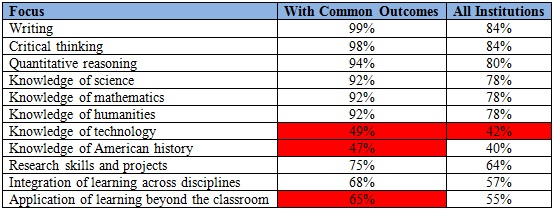PRINT AS PDF
On February 17, 2016, the Association of American Colleges and Universities (AAC&U) released the results of a survey entitled, “Trends in Learning Outcomes Assessment.” The survey was aimed at exploring how colleges and universities “are defining common learning outcomes and to document priorities and trends related to general education, equity, and emerging teaching practices.”
The survey revealed that the majority of AAC&U member schools have common learning outcomes for undergraduate students, there is a strong consensus related to skills and knowledge areas, and that most institutions carry out assessment across most or all departments. Remarkably, even as assessment is an integral element for accreditation 13% of AAC&U member institutions reported that they do not assess learning outcomes. In 2008, 28% reported that they did not assess learning outcomes. However, in 2008, 86% of that subset stated that they were planning to do so. Seven years later, the actual level of assessment activity fell well short of what had been planned. The study did not identify whether any of the institutions failing to assess student learning had been sanctioned by accreditors, but the figure may be sufficiently high to gain attention among some federal policy makers, especially if some accrediting agencies are missing or overlooking the lack of assessment among certain schools.
When it came to intellectual skills, both AAC&U institutions with a common set of learning outcomes and the larger pool of colleges and universities reported having learning outcomes for writing skills, critical thinking, and quantitative reasoning. The majority of both sets of institutions also had learning outcomes for knowledge of science, mathematics, and humanities. However, the proportion of schools with a common set of outcomes reporting such learning outcomes was higher than that for the larger set of institutions. Interestingly enough, even as Americans’ lack of historical knowledge has gained media coverage in the last ten years, fewer than half of surveyed institutions reported having learning outcomes related to knowledge of American history. In terms of integration and application of knowledge and skills, learning outcomes lagged behind those for the priority intellectual skills and knowledge.
Proportion of Institutions that have Learning Outcomes for All Students (2015):

Several focus areas saw the proportion of institutions with learning outcomes decline since 2008. Those areas are denoted in red on the above chart.
In sum, the AAC&U institutions possessing a common set of learning outcomes were somewhat more likely to have learning outcomes for intellectual skills, specific areas of knowledge, and integrated knowledge and skills than those that lacked a common set of learning outcomes. Nevertheless, there was a decline in among institutions reporting learning outcomes in some areas over the past seven years suggesting the possible emergence of gaps in institutional and student learning assessment.


